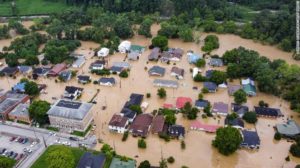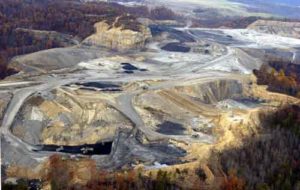Kentucky Flooding and Climate Change
 I am a lifelong Kentuckian with roots in the mountains of Appalachia where devastating flooding is occurring. As I write, 37 are confirmed dead, hundreds are missing, and more rain is expected. This state of emergency follows on the heals of December 2021 tornadoes that leveled a large area of Western Kentucky taking 57 lives followed by powerful ice storms in February. And yet, when I watch the local news no one says the words, “climate change.”
I am a lifelong Kentuckian with roots in the mountains of Appalachia where devastating flooding is occurring. As I write, 37 are confirmed dead, hundreds are missing, and more rain is expected. This state of emergency follows on the heals of December 2021 tornadoes that leveled a large area of Western Kentucky taking 57 lives followed by powerful ice storms in February. And yet, when I watch the local news no one says the words, “climate change.”
This storm brought 14-16 inches of rain to an area that has been pillaged by coal companies for 200 years, where one type of mining literally removes the tops of the mountains to get to the coal seams. Around 300 mountains in Kentucky have been leveled. A scan of news articles on the Eastern Kentucky flood found only one article that connected the impacts of the flood to coal mining. Greedy coal companies took their money and left the land, the miners, and the communities to deal with the environmental and health impacts.
years, where one type of mining literally removes the tops of the mountains to get to the coal seams. Around 300 mountains in Kentucky have been leveled. A scan of news articles on the Eastern Kentucky flood found only one article that connected the impacts of the flood to coal mining. Greedy coal companies took their money and left the land, the miners, and the communities to deal with the environmental and health impacts.
I spent my summers in Knott County, the hardest hit by the flooding, climbing up and down the oldest mountains in the United States, splashing through the creek, listening to mountain music, and eating beans and cornbread. For many, Eastern Kentucky has only negative connotations (poverty, drugs, low education rates). But before wind and water wore them down, the Appalachian Mountains were taller than the Himalayas. These mountains preserved the biodiversity that reseeded our continent following the ice age. Many of us have life because of these mountains. We also owe much of our culture to the area. So much art (pottery, jewelry, paintings, sculptures, wood working, quilts), music, simple but delicious foods, and literature come from Appalachia.
Climate change is here, bringing more frequent and more powerful weather events to places that have already been hit hard by selfishness and greed. The flooding happening now in Eastern Kentucky is another example of layered injustice magnified by climate change. While everyone will be impacted by climate change, the impacts are not equitable or fair. We, as people of faith, have to be the ones to speak up, speak out, and take action on climate. It is a justice issue. Blessed Tomorrow is here to help (see below).
This summer Blessed Tomorrow is hosting a Let’s Talk Climate series on Environmental Justice (Find Here).
Five Steps to Effective Climate Communication
Become a Blessed Tomorrow Climate Ambassador to be part of the solution.
